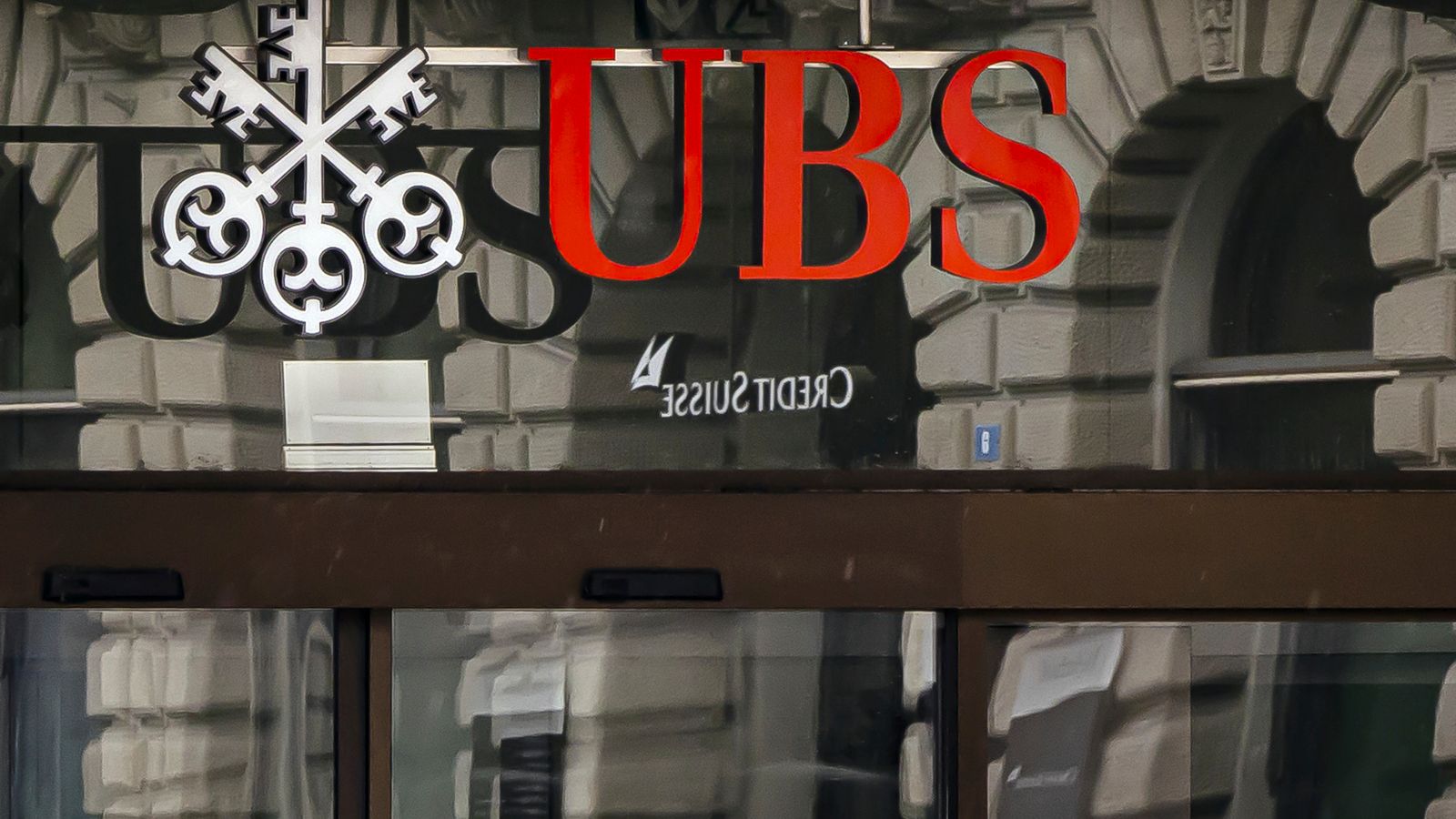UBS takeover of Credit Suisse: Embattled bank’s chairman describes ‘historic, sad and very challenging’ day

UBS will take over Credit Suisse in a deal aimed at stemming what was fast becoming a global crisis of confidence.
Credit Suisse, the 167-year-old embattled lender had been brought to the brink of financial calamity last week, despite securing a $54bn (£44bn) credit line from Switzerland’s central bank.
The credit line was agreed in a move aimed at reassuring markets and depositors, but it failed to stem a rush of customer withdrawal, prompting a request from the Swiss government for the rival UBS to consider a takeover.
That takeover was announced on Sunday evening – UBS will pay 3bn Swiss francs (£2.6bn) to acquire Credit Suisse, it has agreed to assume up to 5bn francs (£4.4bn) in losses, and 100bn Swiss francs (£88.5bn) in liquidity assistance will be available to both banks.
The deal is expected to be closed by the end of this year.
Colm Kelleher, chairman of UBS Group, said the agreement “represents enormous opportunities”.
He also said that his bank’s long-term aim would be to downsize Credit Suisse’s investment banking business and align it with the “conservative risk culture” of UBS.
Axel Lehmann, chairman of Credit Suisse, described the day as “historic, sad and very challenging” for his bank and the global market.
‘The best available outcome’
Advertisement
Mr Lehmann said: “Given recent extraordinary and unprecedented circumstances, the announced merger represents the best available outcome.
“This has been an extremely challenging time for Credit Suisse and while the team has worked tirelessly to address many significant legacy issues and execute on its new strategy, we are forced to reach a solution today that provides a durable outcome.”
‘Exceptional situation’
In a statement, the Swiss central bank and other officials said that the agreement represented “a solution…to secure financial stability and protect the Swiss economy in this exceptional situation”.
It is also hoped that UBS’s takeover of its old rival will avoid the contagion of the kind seen in the financial crisis of 2008.
This combination brings together not only Switzerland’s two biggest banks but two of the most significant financial institutions in the world.
There was reference during the press conference to discussions with Jeremy Hunt, the British chancellor.
That underlines the crucial nature of this deal as governments and financial regulators around the world race to contain the banking sector’s biggest crisis of the last 15 years.
This was always a deal that the Swiss government had resisted. It had been speculated so many times over the last decade, but the Swiss government had always wanted to maintain two national banking champions.
But let’s be clear – all the parties involved in this deal have effectively been strong-armed into it by the crisis of confidence which has erupted at Credit Suisse, and which has been fomenting for some time.
UBS has been effectively strong-armed into doing this deal by the Swiss government, and Credit Suisse has been forced to accept it – there won’t be a shareholder vote on the transaction.
The only alternative to this deal happening was going to be when financial markets opened on Monday in Asia and then in Europe, some form of nationalisation or resolution of Credit Suisse which would have deepened the sense of crisis in the industry.
This government-orchestrated rescue does avert the collapse of a major global bank but while it might be tempting to believe this draws a line under this banking crisis, remember that a week ago HSBC stepped in to buy the British arm of Silicon Valley Bank for £1 after its American parent collapsed, and a number of other mid-sized US banks have been forced to seek emergency support in the last 10 days.
All of this is a sobering reminder that as interest rates risk sharply to combat global inflationary pressures, huge risks continue to lurk in the global financial system.
Central banks insist systems are resilient
The news was welcomed by central banks in the US, Europe and in the UK.
All three insisted that banking systems within their jurisdiction are strong and resilient.
The Bank of England said: “We have been engaging closely with international counterparts throughout the preparations for today’s announcements and will continue to support their implementation.
“The UK banking system is well capitalised and funded, and remains safe and sound.”
Please use Chrome browser for a more accessible video player
1:41
Credit Suisse rescue: What now for the UK’s banks?
A deal likely to ripple through global markets
Credit Suisse is one of the world’s largest wealth managers and is also one of 30 banks ranked as systemically important, meaning the deal is likely to ripple through global markets on Monday.
It is also one of the largest investment banking employers in the City of London, employing around 5,000 people.
In a memo to employees on Sunday, Credit Suisse said there would be no immediate impact on clients or day-to-day working operations, adding that branches and global offices would remain open.
It comes after a difficult few weeks for the banking sector, with the collapse of US lenders Silicon Valley Bank and Signature Bank.
The UK branch of SVB was rescued by HSBC for £1, but a number of other mid-sized American lenders have also been forced to seek emergency funding.